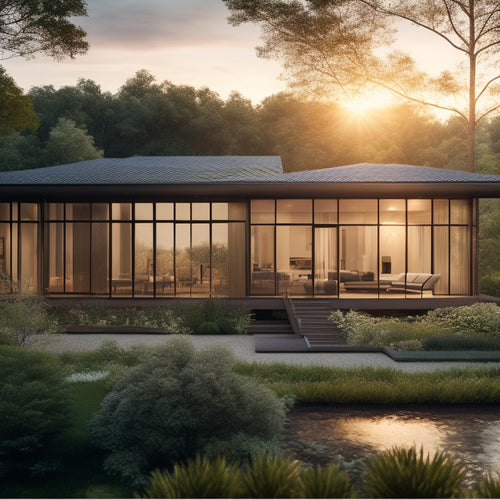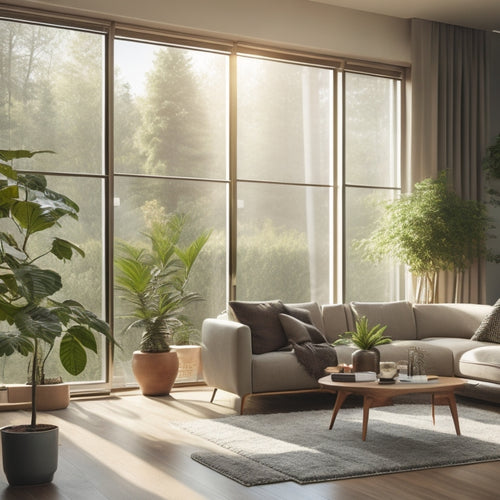
Quieting Your Heat Pump Water Heater: DIY Guide
Share
You've invested in a heat pump water heater to reduce your carbon footprint, but now you're dealing with noisy operation disrupting your peaceful living space. Understanding the noise-generating components, such as the compressor, fan, and pump, is key to addressing this issue. Factors like installation location, heater design, and proximity to living spaces impact noise levels, which can range from 30-60 decibels. By identifying the primary sources of noise, you can employ DIY techniques like insulation, decoupling, and soundproof enclosures to reduce the disturbance. Now, investigate the various noise reduction strategies and maintenance tips to optimize your heat pump water heater's quiet operation.
Key Takeaways
- Understanding the noise-generating components of your heat pump water heater is crucial for effective DIY noise reduction.
- Insulation, decoupling, and vibration dampening can be used to absorb sound waves and reduce vibration noise.
- Building a soundproof enclosure and using acoustic panels can further isolate the heat pump from living spaces.
- Regular maintenance, such as cleaning the air filter and maintaining clearance, is essential for ensuring quiet operation over time.
- Strategically placing sound barriers and using sound-absorbing materials can contain noise within a smaller area and enhance comfort.
Understanding Heat Pump Noise
Most heat pump water heaters produce some level of noise during operation, which can be a concern for homeowners who value a quiet living space.
You need to understand that the noise is a result of the heat pump components working together to transfer heat from one location to another. The compressor, fan, and pump all contribute to the noise level.
Sound wave behavior also plays an important role, as the vibrations from these components can travel through the air and the unit's casing, producing noise.
In addition, reducing carbon footprint environmental responsibility is essential in today's eco-friendly era, and understanding the noise-generating components is significant in achieving that goal.
Factors Affecting Noise Levels
When you're planning your heat pump water heater installation, you'll want to evaluate the location carefully, as it can greatly impact the noise levels you'll experience.
The design of the heater itself is also a critical factor, with some models inherently quieter than others.
Additionally, the installation costs and complexity of commercial EV charging stations Installation Labor and Knowledge can also influence the overall noise levels.
Installation Location Matters
Proximity to living spaces and noise sensitivity are critical considerations when selecting an installation location for your heat pump water heater.
You'll want to find a suitable placement that minimizes disturbance to your daily life. Additionally, incorporating solar-powered charging solutions and energy storage systems can also contribute to a more peaceful environment.
Placing the unit in a basement, laundry room, or utility closet can help contain the noise. If that's not possible, consider using sound barriers to block or absorb the sound.
You can install the heater on a concrete slab or a vibration-dampening pad to reduce transmission of noise through the floor.
Heater Design Impacts Noise
The heat pump water heater's design plays a significant role in determining its noise level, and understanding these factors is essential for minimizing disturbance.
You'll want to look for a unit with a design that prioritizes efficiency and acoustic engineering, much like the eco-friendly highway stops that alleviate range anxiety with renewable energy support renewable energy sources. A well-designed heat pump water heater won't only reduce noise but also optimize energy consumption, similar to how smart charging systems reduce energy waste and carbon emissions.
Some key design elements to evaluate include:
- Compact size: A smaller unit tends to produce less noise than a larger one.
- Sound-absorbing materials: Look for units with sound-dampening materials, such as insulation or acoustic panels.
- Smart fan design: A fan that's designed to operate at a lower speed or with a more efficient blade shape can reduce noise levels.
- Integrated noise-reducing features: Some heat pump water heaters come with built-in noise-reducing features, such as anti-vibration mounts or silent operation modes.
Typical Noise Level Ranges
As you assess the feasibility of installing a heat pump water heater in your home, understanding the typical noise level ranges is vital.
Government incentives, such as tax credits and grants, can help reduce the upfront costs of adopting energy-efficient solutions electric fleet shift.
Typically, heat pump water heaters operate within a sound frequency range of 30-60 decibels (dB). This is relatively quiet, comparable to a normal conversation.
However, some units can reach levels up to 80 dB, equivalent to a vacuum cleaner or a blender. It's important to evaluate these noise levels, as they can impact your daily life.
Opting for a heat pump with high efficiency often means it will produce less noise. Look for units with a high Seasonal Performance Factor (SPF) or Coefficient of Performance (COP) for quieter operation.
Impact of Noise on Daily Life
When evaluating the feasibility of a heat pump water heater, it's essential to contemplate how the noise level will affect your daily routine. As you consider the benefits of this energy-efficient appliance, don't overlook the potential impact on your comfort levels and lifestyle.
-
You may experience daily distractions, decreased productivity, and compromised sleep quality due to noise sensitivity.
-
A noisy heat pump water heater can disrupt your sound environment, affecting your mental health and overall well-being.
-
Excessive noise can also limit your freedom to work, relax, or entertain in your own home.
- By prioritizing a quiet heat pump water heater, you can maintain a peaceful living space that supports your health, happiness, and productivity.
Identifying Noise Sources Easily
Most heat pump water heaters generate noise from three primary sources: fan operation, compressor cycling, and refrigerant fluid flow. To identify these noise sources, you'll need to perform noise detection. Start by turning off the water heater and listening for any remaining sounds. Then, turn it back on and pay attention to the noise patterns.
| Noise Source | Sound Frequency |
|---|---|
| Fan Operation | Low-frequency humming (20-40 Hz) |
| Compressor Cycling | Mid-frequency rattling (40-80 Hz) |
| Refrigerant Fluid Flow | High-frequency hissing (80-120 Hz) |
| Unknown | Take notes and investigate further |
DIY Noise Reduction Techniques
You'll reduce heat pump water heater noise considerably by wrapping it in insulation, which absorbs sound waves.
Next, you'll need to reduce vibration noise by decoupling the unit from the floor or surrounding structures.
Wrap It in Insulation
The heat pump water heater's compressor and fan assembly can generate significant noise, disrupting the peace in your home. To mitigate this, you can wrap it in insulation, creating a thermal barrier that reduces noise radiation.
-
You'll enjoy a quieter home, free from the constant humming and whirring of the heat pump water heater.
-
Insulation types like foam, fiberglass, or reflective insulation can be used, depending on your budget and preferences.
-
By wrapping the unit in insulation, you'll reduce the noise that escapes into the surrounding environment.
- This DIY solution gives you the freedom to enjoy your home without the constant noise pollution.
Reduce Vibration Noise
Wrap the heat pump water heater in insulation to reduce noise radiation, and now it's time to tackle another source of disturbance: vibration noise.
You'll want to minimize the transmission of vibrations from the heat pump to the surrounding structure. To do this, consider using vibration dampeners or rubber pads under the unit's feet. These will help absorb vibrations, reducing the noise that's transmitted through the floor or walls.
You can also use acoustic barriers or adjustable mounts to further isolate the heat pump. If you're looking for a more thorough solution, consider building a soundproof enclosure around the unit, using isolation techniques to decouple it from the surrounding structure.
Use Sound-Dampening Materials
About 70% of noise radiated by a heat pump water heater is airborne, and using sound-dampening materials can greatly reduce this disturbance.
You can effectively minimize the noise pollution by incorporating these materials into your DIY noise reduction strategy.
-
Install acoustic panels around the water heater to absorb sound waves, reducing echo and reverberation.
-
Wrap sound barriers, such as mass-loaded vinyl, around the unit to block sound transmission.
-
Use sound-dampening blankets or moving pads to cover the water heater and surrounding surfaces.
- Add a layer of sound-absorbing material, like open-cell foam, to the interior of the heater's enclosure.
Advanced Noise Suppression Methods
You're likely aware that one of the most considerable drawbacks of traditional heat pumps is their tendency to generate excessive noise.
To combat this, consider implementing advanced noise suppression methods. One approach is to install acoustic panels around the heat pump to absorb sound waves, reducing the overall decibel level.
Another strategy is to create sound barriers using materials like mass-loaded vinyl or acoustic foam to block noise transmission. By strategically placing these barriers around the heat pump, you can effectively contain the noise within a smaller area.
Maintenance for Quiet Operation
Implementing advanced noise suppression methods is only half the battle; to assure your heat pump water heater operates quietly over time, regular maintenance is necessary.
By incorporating routine checks, you'll catch potential issues before they become loud problems.
-
Perform routine checks on your heat pump water heater every 3-6 months to identify and address any underlying issues.
-
Clean the air filter every 1-2 months to guarantee optimal airflow and reduce noise-inducing restrictions.
-
Optimize airflow around the unit by maintaining a clearance of at least 3 feet from surrounding objects.
- Adjust temperature settings to minimize the unit's workload and reduce noise output.
Frequently Asked Questions
Can I Replace My Heat Pump Water Heater With a Quieter Model?
You can upgrade to a quieter heat pump water heater model, but consider factors like energy efficiency and compatibility before replacing your current unit, and be prepared to follow proper installation tips for a seamless shift.
Will Noise Reduction Void My Heat Pump Water Heater's Warranty?
You're tiptoeing around your heat pump water heater, wondering if noise reduction will awaken a warranty beast. Relax, modifying your unit to silence noise complaints typically won't void warranty coverage, but always check your contract to verify you're not sacrificing protection for peace.
Are Heat Pump Water Heaters Louder in Certain Climates or Regions?
You'll find that heat pump water heaters can be louder in regions with extreme climate conditions, such as freezing temperatures or high humidity, as they work harder to maintain performance, and regional variations in installation practices also play a role in noise levels.
Can I Use Soundproofing Materials From a Hardware Store to Reduce Noise?
Like a ninja, you can sneak up on noise reduction by using soundproofing materials from a hardware store, employing DIY insulation techniques to muffle the racket, and silencing the beast that's been disrupting your peace.
Do Heat Pump Water Heaters Produce More Noise During Defrosting Cycles?
You'll notice heat pump water heaters produce more noise during defrost cycles due to increased fan speed and refrigerant flow, resulting in higher noise levels that can be more pronounced than normal operating conditions.
Related Posts
-

Why Merge Earth's Heat With Sun's Energy?
You're about to utilize the full potential of renewable energy by combining the Earth's natural heat with the Sun's a...
-

7 Solar-Safe Window Solutions for Earth-Conscious Homeowners
As an earth-conscious homeowner, you're likely keen to find solar-safe window solutions that align with your values. ...
-

3 Eco-Friendly Automated Blinds for Contemporary Living
You're looking to raise your living space with automated blinds that not only exude contemporary style but also align...


